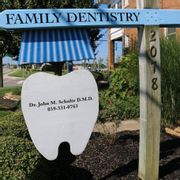
Gum disease, also known as periodontal disease, is a common dental problem that affects many people. If left untreated, it can lead to tooth loss and other serious health issues. In this article, we'll cover some frequently asked questions about gum disease.
Four FAQ About Gum Disease
1. What is Gum Disease?
Gum disease is an infection of the tissues that surround and support your teeth. It's caused by bacteria that accumulate on your teeth and gums, forming plaque. When plaque isn't removed, it hardens into tartar, which can only be removed by a dentist. If left untreated, it can cause your gums to pull away from your teeth, leading to tooth loss.
2. What are the Symptoms of Gum Disease?
The early stages of gum disease are often painless, so you may not even realize you have it. However, some common symptoms include red, swollen, or bleeding gums, bad breath, loose teeth, and receding gums. If you notice any of these symptoms, you should see your dentist as soon as possible.
3. How is Gum Disease Treated?
Treatment depends on the severity of the condition. In the early stages, your dentist may recommend a deep cleaning to remove plaque and tartar from your teeth and gums. They may also prescribe antibiotics to get rid of any infection. In more advanced cases, surgery may be necessary to remove damaged tissue and promote healing.
4. Can Gum Disease Be Prevented?
Yes! The best way to prevent gum disease is to practice good oral hygiene. This means brushing your teeth at least twice a day, flossing daily, and visiting your dentist regularly for cleanings and checkups. You should also avoid smoking, eat a healthy diet, and manage any underlying health conditions, such as diabetes.
Gum disease is a serious dental problem that requires prompt treatment. If you are in the Covington, KY area, consider visiting North Ft. Mitchell Dentistry, John M. Schulte DMD. They offer a wide range of dental services to keep your smile happy and healthy. You can reach them at (859) 331-0763 or visit their website to schedule an appointment. Don't wait until it's too late – take care of your dental health today!
About the Business
Have a question? Ask the experts!
Send your question

